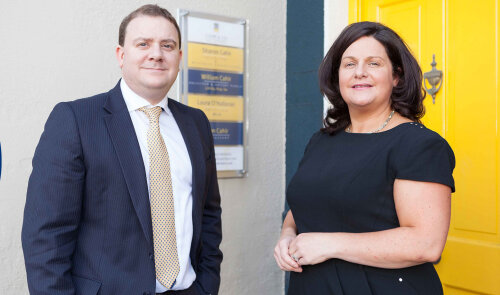Best Defamation Lawyers in Ennis
Share your needs with us, get contacted by law firms.
Free. Takes 2 min.
List of the best lawyers in Ennis, Ireland
About Defamation Law in Ennis, Ireland
Defamation law in Ennis follows Irish national law. Defamation occurs when someone publishes a false statement about a person or organisation that harms their reputation. The law aims to balance protection of reputation with freedom of expression. Civil remedies are available for those who can prove they were defamed, and cases can be brought in local courts. Whether the statement appears in a newspaper, on radio, on a website, on social media, or in private communications, the same basic legal principles apply. Ennis is in County Clare, so matters are heard in the local courts that serve the area, with higher value or complex claims sometimes moving to courts in Dublin.
Why You May Need a Lawyer
Defamation issues can be legally and practically complex. A lawyer can help in many common situations, including:
- You have been publicly accused of criminal conduct, professional misconduct, fraud, or other damaging behaviour and want to stop further publication and seek compensation.
- Material harmful to your reputation has appeared online or in print and you need advice on removing it, preserving evidence, or issuing a takedown request.
- A journalist, broadcaster, business, or individual refuses to correct or withdraw false statements after you asked them to do so.
- Someone has made repeated false statements that harm your business or livelihood, and you want to explore injunctive relief or damages.
- You have been identified personally because of a statement that was ostensibly about someone else and want to know whether you have a claim.
- You are accused of defamation and need advice on defence strategies, responding professionally, and managing the litigation risk and costs.
- You want to negotiate a settlement, apology, correction, or offer of amends without pursuing full litigation.
Local Laws Overview
Key legal points that apply in Ennis and across Ireland include:
- Governing statute: The Defamation Act 2009 is the principal statute dealing with civil defamation claims in Ireland. It sets out causes of action, available remedies, and statutory defences.
- Elements of a claim: To succeed you generally must show that a statement was published to a third party, it referred to you, and it damaged your reputation.
- Defences: Common defences available to a defendant include truth (justification), honest opinion, absolute privilege, and qualified privilege. The availability and scope of these defences depend on the facts and context.
- Remedies: Courts can award damages, order corrections or apologies, and grant injunctions to prevent further publication. Costs may be awarded to the successful party.
- Time limits: Defamation claims are time-sensitive. There is typically a one-year limitation period from the date of publication. Courts have limited discretion to extend that period in certain circumstances - timing is important, so seek advice promptly.
- Online publication: Statements published online or on social media are treated the same as other publications for defamation purposes. Preserving screenshots, URLs, and metadata is important evidence.
- Jurisdiction and venue: Local courts serving Ennis include the District Court and the Circuit Court. Many defamation claims are heard in the Circuit Court, but higher-value or legally complex cases may be dealt with in the High Court.
- Pre-action practice: Before issuing proceedings parties commonly exchange letters setting out the complaint and requesting correction or retraction. Seeking legal advice before sending such letters is recommended to avoid escalating the dispute.
Frequently Asked Questions
What exactly counts as defamation in Ireland?
Defamation is a false statement presented as fact about a person or organisation that harms their reputation in the eyes of reasonable members of society. It must be published to at least one person other than the subject. Opinions framed as opinion and clearly labelled as such can be defended, provided they are honestly held and based on facts.
How long do I have to bring a defamation claim?
Time limits are short. There is normally a one-year limitation period from the date of publication. Courts have narrow discretion to extend the time in some circumstances, but delay can jeopardise your case. Get legal advice promptly if you believe you have been defamed.
Can I sue for something posted on social media?
Yes. Social media posts are treated like any other publication. You should preserve evidence immediately - take dated screenshots, save URLs, note usernames and any replies or shares. Identifying the correct defendant - the author, platform, or publisher - may require legal and technical steps.
What defences can a defendant use?
Common defences include truth (if the statement is substantially true), honest opinion (a recognizable opinion based on facts), absolute privilege (in certain protected contexts), and qualified privilege (where there is a legal, moral, or social duty to publish and reasonable conduct by the publisher). Each defence has specific requirements and limits.
How much can I recover in damages?
Damages vary widely and depend on the seriousness of the allegation, the extent of publication, and the harm to reputation. Courts also consider whether the defendant acted maliciously. Legal costs can be significant, so a realistic assessment of likely recovery versus cost is necessary when considering litigation.
Can I get an injunction to stop further publication?
Injunctions to prevent further publication are possible, but courts balance the right to reputation with freedom of expression. Preliminary or interlocutory injunctions require a strong case and proof that damages would be an inadequate remedy.
Should I send a letter before action or demand an apology first?
It is common to send a formal letter asking for correction, removal, or apology before starting litigation. A solicitor can draft a precise letter that preserves your rights and communicates your expectations. In some cases, an offer to make amends can lead to a prompt settlement without court proceedings.
What if I am accused of defamation - do I need a lawyer?
Yes. If you are accused, early legal advice helps you craft a proportionate response, consider defences, and reduce exposure to damages and costs. A lawyer can advise on whether to apologise, correct, defend, or settle, and can manage communications to avoid worsening the situation.
Can the Legal Aid Board help with a defamation case?
Civil legal aid is limited in Ireland and is usually means-tested. The Legal Aid Board can advise whether you qualify for assistance. Many defamation matters are handled privately, but you should ask about eligibility for legal aid or pro bono assistance if finances are a concern.
What evidence should I collect if I think I have been defamed?
Collect everything that proves the publication and its impact: dated screenshots, copies of printed material, URLs, contact details of witnesses, records of loss or harm to business or income, correspondence with the publisher, and any attempts to correct or remove the material. Keep original files and avoid deleting the material, but do not escalate by posting about it publicly without legal advice.
Additional Resources
For further help and authoritative information in Ireland consider contacting or consulting materials from the following organisations and bodies:
- The office responsible for courts and court procedures in Ireland - for information on where defamation cases are heard and how to start proceedings.
- The Law Society of Ireland - for guidance on solicitors and how to find a lawyer with defamation experience.
- The Bar of Ireland - for information on instructing counsel in complex or High Court cases.
- The Legal Aid Board - for information on means-tested civil legal aid and eligibility.
- Citizens Information - for accessible summaries of civil law rights and court procedures.
- The Press Council and the Office of the Press Ombudsman - for complaints about journalism and newspapers; these are non-legal complaint routes that may achieve correction or apology in some media cases.
- Data protection and privacy authorities - where defamatory content also breaches privacy or data laws you may wish to seek specialist advice.
When contacting organisations, ask whether they can recommend specialist solicitors or dispute resolution services experienced in defamation.
Next Steps
If you believe you have been defamed in Ennis, consider the following practical steps:
- Preserve evidence immediately - take dated screenshots, save copies of publications, note where and when the material appeared, and identify witnesses.
- Avoid public replies that may aggravate the dispute - discuss responses with a solicitor before posting or publishing further comments.
- Seek an early legal consultation with a solicitor experienced in defamation law. During that meeting discuss your objectives - removal, apology, correction, damages, or simply a risk assessment.
- Be ready to provide your solicitor with a clear timeline, copies of all evidence, and details of any contacts with the publisher.
- Consider pre-action options - a formal letter demanding correction or removal can be effective and is often a necessary step before litigation.
- Ask about costs, likely outcomes, and alternative dispute resolution options such as negotiation or mediation.
- If urgent harm is occurring, discuss emergency options such as seeking interim relief from the court.
Your solicitor will guide you through the applicable legal tests, likely defences, the appropriate forum, and a strategy that matches your goals and budget. Early advice improves the chance of a favourable outcome and helps avoid unintended consequences.
Lawzana helps you find the best lawyers and law firms in Ennis through a curated and pre-screened list of qualified legal professionals. Our platform offers rankings and detailed profiles of attorneys and law firms, allowing you to compare based on practice areas, including Defamation, experience, and client feedback.
Each profile includes a description of the firm's areas of practice, client reviews, team members and partners, year of establishment, spoken languages, office locations, contact information, social media presence, and any published articles or resources. Most firms on our platform speak English and are experienced in both local and international legal matters.
Get a quote from top-rated law firms in Ennis, Ireland — quickly, securely, and without unnecessary hassle.
Disclaimer:
The information provided on this page is for general informational purposes only and does not constitute legal advice. While we strive to ensure the accuracy and relevance of the content, legal information may change over time, and interpretations of the law can vary. You should always consult with a qualified legal professional for advice specific to your situation.
We disclaim all liability for actions taken or not taken based on the content of this page. If you believe any information is incorrect or outdated, please contact us, and we will review and update it where appropriate.










